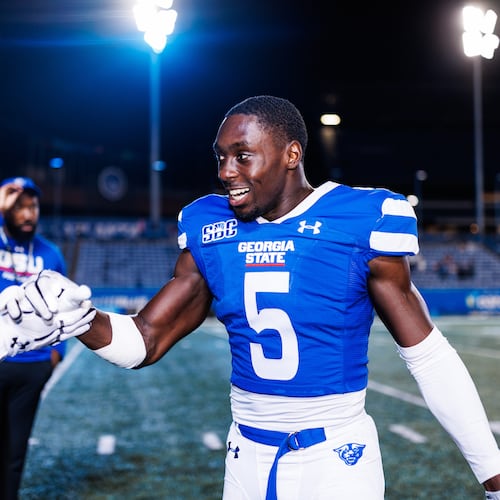At the halfway point of his first season as coach at Georgia Tech, Geoff Collins pointed at intangibles such as culture and process as signs of improvement. He said that he hated that the scoreboard didn’t show the progress that the Yellow Jackets are making, but assured that on-field results will follow as his team adheres to the standards that he and his staff are setting.
The Yellow Jackets reach the midway point of the regular season at 1-5, the only one-win team in the ACC. At his Tuesday news conference, he spoke of the standard that the team has to meet in matters such as attention to detail and competitiveness. He shared that he tells the team not to worry about the scoreboard, but just to worry about each individual play.
“The results are going to eventually take care of themselves through the process, through doing the things that we are going to do to be an elite program,” Collins said.
It was not a message that invokes great hope for the second half of the season, starting with the Jackets’ game Saturday at Miami. Tech’s 1-5 record falls in line with various statistical benchmarks – the Jackets rank 121st in FBS in total offense, 93rd in total defense and 100th in the Sagarin ratings.
But Collins pointed to the past two games, when the Jackets fell behind 17-0 to North Carolina and 38-7 to Duke before fighting back to lose 38-22 to the Tar Heels and 41-23 to the Blue Devils. Those results followed the Jackets’ 24-2 loss to Temple and their 27-24 overtime defeat to The Citadel. The team’s second-half play in the past two games, Collins said, was an indicator of its culture.
“I don’t think anything signifies it as much as the way they’ve come out in the second half and competed and battled, regardless of the circumstances, and continue week in and week out to improve,” he said.
Collins said also that the team has “gotten better in every single phase. We’ve just got to understand, in critical moments, we can’t have setbacks.”
In the loss against The Citadel, it was costly penalties. Against Temple, it was two lost fumbles and an inability to stop the run. Against North Carolina, in quarterback James Graham’s first start, it was an inconsistent passing game and the defense’s ineffective play on third down. In the loss to Duke, it was a failed second quarter in which the Jackets could not recover from a mounting series of mistakes and big plays foisted upon them.
“The six games are what they are,” Collins said. “What can we learn from every game to improve on and get better, so that the result is going to be a positive one?”
A place where both sides need growth, both offensive coordinator Dave Patenaude and defensive coordinator Andrew Thacker said, was in players executing when called upon. As Patenaude put it, “elite teams have elite dudes making elite plays offensively.” It could be an offensive tackle holding off a defensive end in a one-on-one matchup or a quarterback making the right read and pass. He mentioned, as an example, that tight end Tyler Davis dropped a pass against Duke that would have been a first down.
“And so we’re still up and down with that right now,” he said.
Tech has gone three games without forcing a fumble. The Jackets rank 111th in defensive third-down efficiency at 44.68 percent. Thacker didn’t absolve himself or his staff from needing to improve, but has called upon his players to deliver.
Thacker said that one of the messages to the defense for the Miami game is “playmakers making plays this week. Do your job and then when it comes to you, make a play – make a big-time play – and we need to have that happen more often.”
“We’ve had moments on defense where we’ve played well at times,” Thacker said. “We’ve played well in stretches. We have to have composure over the course of the game and carry that on as we continue to go.”
Thacker sees a young defense, which plays only two seniors (defensive tackle Brentavious Glanton and safety Christian Campbell) gaining experience for the future.
“They’re learning from those experiences,” Thacker said. “We want it to manifest itself on the scoreboard so badly, and we will continue to fight to that end.”
Patenaude said that the offense has been able to run the ball well and control the line of scrimmage. Tech ranks 71st nationally in rushing yards per game (162.5 yards per game) and 77th in yards per rush (4.22 yards per attempt). Running back Jordan Mason is seventh in the ACC at 70.8 yards per game.
“Really, really good in spurts, other times hit or miss,” Patenaude said of the run game. “But I think if you look at our total run numbers and our total run efficiency, which we calculate every week, I’m happy with where they are.”
The passing game has made progress, he said, but is “extremely inconsistent from a protection standpoint, from a quarterback location standpoint.” Tech has given up 18 sacks, ninth in the ACC, and has completed 46.6 percent of passes, the fourth lowest rate in FBS. He said that Graham has made “tremendous” progress and impressed him in his ability to absorb new pass schemes and also new defensive coverages. Patenaude recalled a pass Graham made against Duke to wide receiver Adonicas Sanders on a third-down play when Sanders was the third option.
“That’s huge progress for a young quarterback, to be able to get to your third read and dump the ball and just be patient in the pocket,” Patenaude said.
About the Author
Keep Reading
The Latest
Featured

